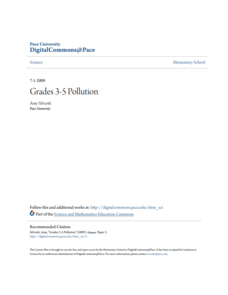British Council
Litter Poem
What a load of rubbish! Using the resource, pupils listen to a poem about litter pollution and discuss the poem's language. After completing a worksheet about the poem, they write their own anti-litter poetry.
Pace University
Pollution
Over the course of 10 days, scholars take a pre-assessment to place them in one of three leveled groups. Whole-class and in small groups, pupils take part in read-alouds, field trips, hands-on activities, and complete learning contracts...
Chicago Botanic Garden
Leaf Litter Ecology Lab
Some organisms spend their entire lives in leaf litter. The third in a series of six is a great lesson exploring the community of leaf litter. Groups gather and then spread leaf litter over white paper and remove leaves/twigs while...
Wilderness Classroom
Pollution
Educate scholars on pollution—air, water, and land—with a series of lessons that begin with a thorough explanation of each type. Learners then take part in three activities to reinforce the importance of reducing pollution. They...
Curated OER
Litter From Lunchtime
Students explore environmental care by participating in a litter identification activity. In this food trash lesson, students discuss the destruction litter causes in our environment and ways we can avoid littering ourselves. Students...
Alabama Learning Exchange
Good Litter, Bad Litter
Which ones can be thrown on the ground? Discover the difference between natural litter and unhealthy trash, helping scholars by using several examples. Use the information here to give them a basic background, but also encourage prior...
Curated OER
Litter Critters
Explore biology by conducting an organism search field trip! Young explorers discuss how litter impacts the environment and how some organisms find solace in the trash we leave behind. Several worksheets are included here.
Curated OER
Recognizing Litter
When does trash become litter? Use this litter awareness lesson to help them understand the importance of trash disposal. Get learners engaged by reading Nancy Loewen's Lady Lulu Liked to Litter (not included). After discussing what...
Curated OER
Recognizing Litter
When is it litter? Help your environmentally friendly scholars differentiate using this visual worksheet. They examine two images: before it becomes litter, and after it becomes litter. The images can be colored in completely, or you can...
Curated OER
Drying flowers
Detailing the common methods for drying flowers and other materials commonly used in the floral industry, this presentation provides excellent specifics about the best use for each method, and the results that can be expected.
Indian Land Tenure Foundation
Leaders' Decisions and Actions
Community leaders try to make choices that protect the community and the environment. Little ones learn about how tribal communities look to their chief to guide the decision-making process. Your class will become part of the community...
Curated OER
Litter Crusade
Litter, garbage, and pollution are all addressed in a nice lesson on waste and recycling. Learners discuss what litter is and how it affects the environment. Then, they sing a song about eliminating litter before going out on campus to...
Alabama Learning Exchange
Nature's Life Cycle
Become a member of the Pollution Patrol and stand up to litter! After discussing the life cycle of seeds and discussing how plants figure into the food chain, young conservationists engage in several activities involving podcasts,...
Curated OER
When it is Wrong to Belong: Scavenger Hunt
Students participate in a scavenger hunt to find different types of trash items around different environments. They distinguish between man-made litter and natural materials.
Curated OER
Scientific Inquiry
Students create a poster. In this recycling lesson, students discuss pollution and the ways humans negatively affect the environment. Students describe examples of litter or pollution they have experienced. Students collect litter from...
Curated OER
Naturalist Activity Workbook
In this Webelos naturalist instructional activity, learners list short answers to 13 questions and assignments. The instructional activity also includes a list of online resources.
Curated OER
Talking Trash - Marine Debris
Students bring in different trash items and define "marine debris" through a discussion about these items. They categorize debris and use statistics and graphing to better explain the types and amounts of marine debris found each yea
Curated OER
The Candy Thief
Students research what kind of punishments local judges give for these. Students research what kind of punishments other judges elsewhere might give. Students report their findings to the class and perhaps to local judges or another...
Curated OER
Be Considerate of Others
Students explore the environment by participating in an outdoors activity. In this nature appreciation lesson, students discuss how to minimize their human imprint when experiencing nature. Students conduct a nature walk and plan out an...
Curated OER
Litter
Students discuss the concept of littering and what they do personally to contribute or prevent littering. In this environmental awareness lesson, students create a jingle, or a commercial to promote recycling. Links to some excellent...
Curated OER
Litter
Students discuss and research litter and write an anti litter poem. In this litter lesson plan, students also discuss what they can do to stop litter.
Curated OER
Packaging Your Product!
Fifth graders discuss the functions, benefits and drawbacks of packaging. In this product package lesson students design alternative packaging and write an essay to deal with the issues of packaging.
Curated OER
Beach Litter
Students view a slide show on littering. In this beach litter lesson, students view a slide show about littering. Students develop knowledge about how littering harms animals and how to keep the beach clean.
Curated OER
It's a Wrap!
Students read about the importance of packaging foods and related items properly and reducing waste. In this packaging lesson, students read the background information about packaging and bring a variety of packaging materials to class....
























